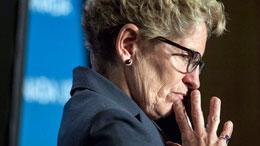The power of anger over energy pricing

Guest Commentary
By Peter Shawn Taylor
Elections are often considered to be referendums on the economy. When the economy is performing well, incumbent governments are supposed to benefit from a contented electorate. That’s not what happened in Ontario.
By most measures, the Ontario economy is doing just fine. Unemployment, one of the most important indicators for voters, is the lowest it’s been in several decades. Gross domestic product (GDP) growth is in the two per cent range – decent, if not spectacular. Housing starts and other measures of consumer spending seem reasonably strong as well.
Nevertheless, Ontario’s long-governing Liberals were just shown the door in spectacular fashion. Voters were willing to look past the Liberals’ ugly scandals in previous elections for the sake of predictability. But when voters looked at the economy this time, they plainly couldn’t get past one aspect of it that was actually in horrible shape: energy affordability.
Despite a fairly favourable economic situation in Premier Kathleen Wynne’s favour, it was her Liberal Party’s epic mismanagement of the electricity file in particular that dominated her opponents’ platforms and captured voters’ minds. Meanwhile, her cap-and-trade system of carbon dioxide taxes was slowly making most other forms of energy needlessly more expensive. In a mid-campaign poll by Ipsos, more than 60 per cent of Ontario voters said hydroelectricity prices would have an impact on their vote in the provincial election, with Ford’s Progressive Conservatives as the top choice to fix the problem.
Every government in Canada should take note of Wynne’s fate.
Liberal clownery on electricity prices almost defies description. Between 2008 and 2016, Ontario’s residential electricity costs grew by more than 70 per cent, doubling the average rate increase in the rest of the country over this time. Large industrial users also suffered, with costs in some cities spiking more than 50 per cent between 2010 and 2016.
According to the provincial auditor general, the Liberals’ fixation with subsidizing uneconomic renewable energy sources such as solar and wind meant Ontarians paid about $37 billion more than they should have for their electricity.
Then came the Liberal government’s decision to implement a costly cap-and-trade system of carbon taxes – forcing Ontarians to pay more for gas, heating fuel and other necessities of life. Next year, these taxes will add nearly $300 to the average Ontario family’s expenses. Yet this tax grab is expected to have no impact on provincial carbon emissions in the short term.
When voter outrage over these catastrophes began rising to a fever pitch, the Wynne government responded with a transparently phoney attempt to immediately lower hydro prices by 25 per cent, at the cost of much higher prices down the road. The deceptive way in which the Liberals arranged the financing for this bogus price cut, by deferring payments at extra cost, added another $4 billion in unnecessary costs onto consumers’ backs, according to the auditor general.
The solution to all this madness?
Ford Nation.
Under leader Doug Ford, the Progressive Conservatives successfully campaigned to undo all of Wynne’s failed energy policies. The incoming premier (he officially takes over on June 29) promises to scrap the Liberals’ costly and misguided Green Energy Plan, tear up improvident contracts, shake up the leadership at the provincial hydro company and deliver a 12 per cent rate reduction to Ontario families. He has also taken a bold stand in vowing to end Ontario’s cap-and-trade scheme and to fight any move by Ottawa to impose a carbon tax unilaterally on the province on constitutional grounds. Plus, there’s to be an immediate 10-cent-per-litre cut in the provincial gas tax.
In taking a stand against Canada-wide carbon taxation, Ford has performed two important services.
He has put to bed the political falsehood – peddled by the media, green lobbyists and political consultants – that politicians can only win office by supporting carbon pricing. It would now seem the opposite is closer to the truth.
And Ford is aligning himself with the governments of Saskatchewan, Manitoba and Alberta – if Opposition Leader Jason Kenney wins power in his province come the next election, as is expected by many – in opposing federal climate change policy. This could mean more than half the country’s population will be set against Prime Minister Justin Trudeau’s plan for a national carbon tax.
Ford will no doubt face considerable pressure from various pro-tax organizations, lobby groups and even his own bureaucracy as he pulls Ontario from this federal scheme. He must resist them with all his strength because the pressure to break his promise on cap-and-trade will be immense. Ford must never forget that it was anger over energy prices that vaulted him into power in the first place.
For political leaders elsewhere in Canada, the takeaway from Wynne’s loss and Ford’s win lies in recognizing the significance of affordable energy, and carbon taxes in particular, as election-deciding, dynasty-ending, pocket-book issues for voters.
Politicians who mess around with energy prices can expect to get a jolt at election time.
Peter Shawn Taylor is a journalist, policy research analyst and a contributing writer for Canadians for Affordable Energy.









